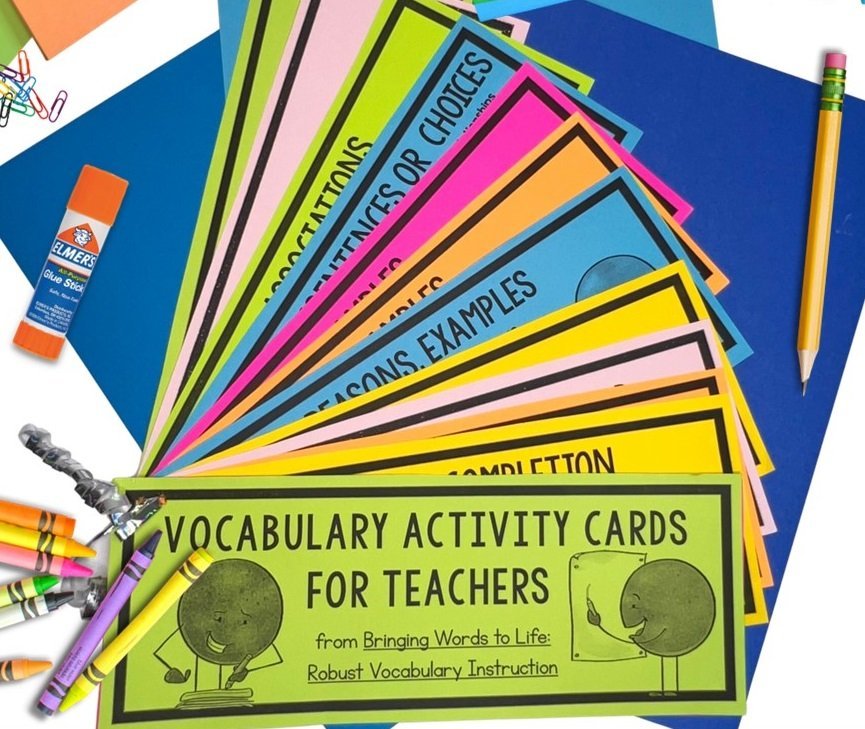
Teaching vocabulary is really important, and we especially need to teach prefixes, suffixes, and roots. Learning prefixes and suffixes begins typically in second grade, but for many, mastery occurs closer to fourth grade. I think the reason is that struggling readers just need more repetition to fully grasp how these word part contribute to a word’s overall meaning. In this post, I’ll share a variety of ideas you can use to work vocabulary instruction into your daily routine.
VOCABULARY WORD GAMES

Kids love games, and when they come in in the morning, aren’t they normally dragging? (or maybe it’s just in my school??) Anyway, if they have a fun routine set up, they will be more motivated to get in, unpack, and get with their team for game time. Rewarding with team points or prizes may be a great incentive too. Many traditional board games can be modified to practice your skills or even used as is. Boggle and Bananagrams are two that pop in my mind. I also recently came across Pears which is a game of homonyms. With prefixes and suffixes, you could modify the discs for Connect Four and have students try to blend prefixes, roots, and roots to form words. Another idea I thought of is Prefix/Suffix Dominoes. Here are a few freebies I found on TPT to get you started.
TAKING ADVANTAGE OF TRANSITIONS

Building Vocabulary with Mystery Words
Kids love challenges, and one way to review or practice prefixes and suffixes is with Mystery Words. The teacher can gives clues for the mystery word such as:
- This word has a word part that means without.
- It would describe a person who can be disorganized.
- This word is an antonym for neat and cautious.
- It is a synonym for someone who acts before thinking.
Careless
Exit Tickets
Another easy way to practice prefixes and suffixes is to have students name words with a certain prefix as their exit ticket Once the group is lined up or has exhausted the words with that prefix or suffix, the teacher can either start another list with a new prefix/suffix or quickly discuss how the words are alike in meaning (elbow partners if you are in the classroom). Imagine the great discussion.
Odd One Out:
One last idea with transitions is Odd One Out. This works well with categorizing, but how about prefixes…
under, undone, unpack, untie…which does not belong?
pretest, pretend, preschool, preset…which does not belong?
VOCABULARY ACTIVITIES FOR GROUPS

Word Building Ideas:
Word building is lots of fun, and it’s a great way to create opportunities for repeated exposure to words. After all, students need many exposures to new vocabulary (12-15 exposures) for words to become part of your working vocabulary. When students come together to build words, the discussion takes everyone to a higher level. One simple activity is to print prefix, root, and suffix cards and have students combine them in different ways to see how many words they can create.
Vocabulary Quick Writes:
Another fun option is to do a quick write. Quick writes are great for so many lessons such as for brainstorming lists of ideas and as a way to brainstorm story starters, so why not apply that idea to word building too. Have students quick write all the words they can think of with XXX feature. As I mentioned earlier, kids love competition and quick writes work well for building on that enthusiasm.
Greek and Latin Roots:
Finally, it’s important to prioritize the parts teachers teach. Be sure to choose high utility word parts and roots. This list of recommended Greek and Latin roots, prefixes, and suffixes by grade level might be helpful.

Subscriber Freebie:
Other Vocabulary Posts You’ll Enjoy:
- 20+ Ways to Keep Vocabulary Instruction Fresh and Fun
- 10 Ways to Embed Vocabulary in Every Lesson
- Vocabulary Instruction…What? Why? How? and When?
Vocabulary Activities for Any List:
-
Sale Product on saleVocabulary Activities for ANY Word List Lessons Context Clues in Digital and PDF
$14.99Original price was: $14.99.$9.95Current price is: $9.95.
In the previous posts, I focused on Context Clues and Synonyms and Antonyms. You can check out those posts by clicking on them above. In them, I shared a few freebies including the Degrees of Meaning Sort and the Parking Lot Game for Overused Words. These activities work very well for modeling as well as post lesson practice for centers. Do you have special ways that you help your students with vocabulary? I would love to hear all about them. Please share in the comments. Until next time, happy reading and word building!


























One Response
Nice!!